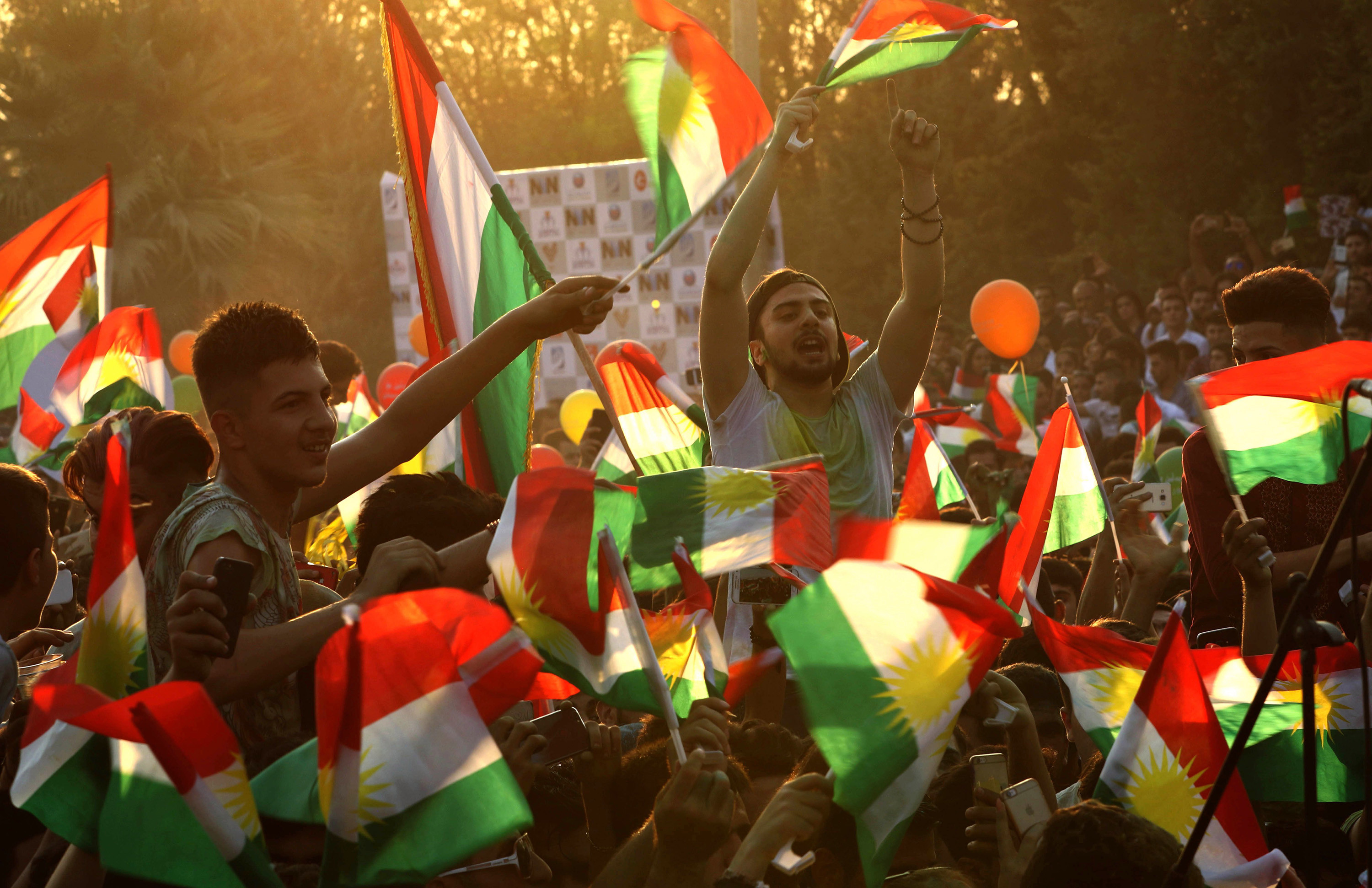Three days before Iraqi Kurdistan Region held their September 25, 2017 referendum for independence, the Kurdish-held administration of de facto autonomous areas in northern Syria held the first local elections to select representatives of so-called communes. The September 22 communal elections indicate a “Kurdish phenomenon” taking shape in Syria and Iraq, the two neighboring countries hit by a deteriorating security situation and are equally likely to be divided.
Despite the ongoing conflicts in the two countries, the Kurds are willing to speed up steps that can be built on in the future to fulfill their long-cherished ambition for independence. To this end, they pursued several mechanisms including initiating talks with the Syrian regime about Kurds in the coming future.
However, the potential for Syria to gradually slide into a situation similar to that in Iraq was reinforced by failure of two rounds of talks between the Kurds and the regime to find a common ground to achieve convergence of views, as well as by the Kurds’ incessant attempts to impose their project through a fait accompli situation on the ground despite the multiple existing geopolitical, demographic and logistical challenges facing their bid to establish a decentralized federal system in Syria.
Syrian Kurds’ push for autonomy gave rise to views that an “Iraqi model” is likely to be enforced in Syria where the Alawites keep their grip on power in the so-called “useful Syria” and the Kurds keep their control of their current areas keeping Syria’s other ethnic groups and religious sects, the Sunnis, outside the country's envisaged balance of power.
Kurds’ Project Outline
The “Kurdish project” in Syria can be defined by three main characteristics.
Firstly, the project lacks territorial contiguity between the three self-governing cantons as al-Jazira, Kobani, and Afrin are not territorially contiguous. This divisive geography will continue to pose a significant challenge to the Kurds’ ambition for establishing one consolidated region for themselves. As long as the map shows “dispersed islands”, there will always be a strategic challenge to any attempts to demarcate clearly-defined geographical borders for the aspired-for state.
Moreover, from a logistical point of view, areas such as Deir Ezzor that continue to be gripped by conflict represent a significant economic mainstay on which the Kurds rely to support their bid to establish and rule this region. The eastern Syrian province is currently the scene of fighting between the Kurds, on the one side, and Bashar al-Assad regime and its allies, on the one hand, and still represents a “main reservoir” for ISIS after it was besieged in Raqqa. Given this situation, the liberation of this province is likely going to be a prolonged process.
Secondly, the project is marred by lack of demographic coherence. That is, being densely populated by the Kurds does not mean that the three de facto Kurdish cantons are Kurdish-majority areas, simply because no precise statistics can prove otherwise. According to the last official census carried out before 2011, the Kurds represent no more than 15 per cent of Syria’s population. Moreover, Arabs are a component of the so-called Syrian Democratic Forces (SDF), a predominantly-Kurdish militia, and are likely to be satisfied with whatever policies pursued by the Kurds in these areas.
Thirdly, lack of solid economic infrastructure and adequate resources that can empower establishment of an independent Kurdish region is further exacerbated by the Kurds’ inability to rely on borders they share with existing states to reinforce the authorities’ ability to maintain autonomous administration.
Moreover, statements delivered by Kurdish leaders indicating that Iraq’s Kurdistan Region, with which Syria’s Kurds recently tried to build convergence, can be a likely corridor for these cantons to the outside world, do run contrary to the reality on the ground. Kurdistan Region itself faces no easy challenges exacerbated by the tough stances of the central Iraqi government as well as Turkey and Iran which seek to elevate their coordination, as evidenced by Turkish President Recep Tayyip Erdogan’s October 4 visit to Iran.
Divergent Positions
Of note, al-Assad regime in Syria has not adopted a clearly-defined policy towards the Kurds’ ambitions. It adopted several approaches but has not ruled out military action against them. The approach was clearly expressed by the regime’s deputy foreign minister Faisal Mekdad who dismissed the September 22 Kurdish elections as a "joke”, and emphasized that “Syria will never ever allow any part of its territory to be separated” and that Syrian forces will retake all of the Kurdish-controlled areas.
However, the Assad regime lowered the ceiling and struck a conciliatory tone signalling that it was open to negotiations over their demand for autonomy. Foreign Minister Walid al-Moualem stated that the regime is open to negotiations with Kurds over their demand for autonomy only within Syria’s borders and after ISIS is defeated.
Undoubtedly, the Assad regime’s approach to the Kurdish issue will take into consideration several variables. The most important of which are the de facto situation imposed by the SDF in conflict zones under the umbrella of the US-led Global Coalition to Counter ISIS, as well as US military support to the Kurdish militia, which sparked tensions between Washington and Ankara which views it as as the Syrian wing of the outlawed Kurdistan Workers' Party (PKK), already involved in armed confrontations with the Turkish government.
That appears to be what drove the regime to solicit support from the Kurds to back its plans to expand its areas of control and gain leverage against Turkey which plans to expand its military presence inside Syria, as part of recent understandings reached with Russia and Iran during the latest round of talks held in Astana.
Hence, it can possibly be concluded that these parties seek to expand their room for maneuver and free movement to deal with the realities imposed by developments taking place in the political arena and on the ground in Syria, while also avoiding supporting the possibility of reaching understandings about the Kurdish issue in the coming period.


